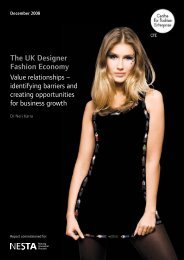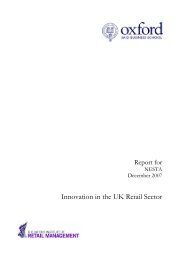Everyday innovation report - Nesta
Everyday innovation report - Nesta
Everyday innovation report - Nesta
You also want an ePaper? Increase the reach of your titles
YUMPU automatically turns print PDFs into web optimized ePapers that Google loves.
8<br />
1. Department for Innovation,<br />
Universities and Skills (2008)<br />
‘Innovation Nation’. White<br />
paper. London: DIUS.<br />
2. Patterson, F., Kerrin, M.<br />
and Gatto-Roissard, G.<br />
(2009) ‘Characteristics and<br />
Behaviours of Innovative<br />
People in Organisations.’<br />
Literature Review prepared for<br />
the NESTA Policy & Research<br />
Unit. London: NESTA.<br />
Part 1: Introduction<br />
1.1 Background<br />
Innovative working is now at the very heart<br />
of the UK government and corporate agenda.<br />
Policymakers recognise that to remain<br />
competitive, and indeed survive, in the face of<br />
unprecedented economic, social, demographic<br />
and environmental challenges, organisations<br />
need to adopt new approaches to encourage<br />
innovative working. Many argue that<br />
prioritising <strong>innovation</strong> is one of the few ways of<br />
delivering higher value goods, business models,<br />
and services. In particular, the White Paper<br />
Innovation Nation published in Spring 2008<br />
by the Department for Innovation, Universities<br />
and Skills (DIUS), 1 gave a prominent place to<br />
<strong>innovation</strong> and people in organisations, in all<br />
sectors.<br />
Since the 2008 DIUS White Paper, the<br />
world has changed. Our research study<br />
was commissioned in September 2008. By<br />
late autumn 2008 the extent of the global<br />
economic crisis was only just unfolding. As<br />
a result of these changes, we review the<br />
extent to which the imperative to promote<br />
innovative working in all sectors remains.<br />
The focus of this <strong>report</strong> is on defining the<br />
characteristics and behaviours associated<br />
with innovative working in organisations.<br />
With few exceptions, there has been a lack of<br />
integration of the psychology, management<br />
and entrepreneurship literatures in this area.<br />
There has been a tendency to analyse large<br />
scale, top-down <strong>innovation</strong> initiatives with<br />
little attention on the important role that<br />
employee characteristics and behaviours play in<br />
innovative working in organisations. As a result,<br />
the research literature often fails to provide<br />
direct recommendations regarding validated<br />
interventions on how to promote innovative<br />
working in organisations. In this <strong>report</strong> we<br />
address this deficiency by exploring the human<br />
resources required and case examples of<br />
interventions to promote innovative working<br />
across all sectors.<br />
1.2 Aims and deliverables<br />
The overall aims of the research are to:<br />
• Identify the employee characteristics<br />
(attitudes, skills, abilities) and behaviours<br />
that contribute to innovative working.<br />
• Assess the effect of the organisational<br />
context and culture in enabling or inhibiting<br />
innovative capability and behaviour in<br />
individuals.<br />
• Determine whether, and how, such<br />
innovative characteristics and behaviour<br />
can be developed in individuals within<br />
organisations.<br />
• Identify methods whereby this development<br />
can be actively stimulated within<br />
organisations.<br />
Specific deliverables include:<br />
• A systematic and extensive literature review<br />
relevant to innovative people in organisations<br />
drawing upon entrepreneurship, <strong>innovation</strong>,<br />
and the business and psychological<br />
literatures. 2<br />
• Development of a framework to summarise<br />
the various resources available within an<br />
organisation for innovative working. 3







